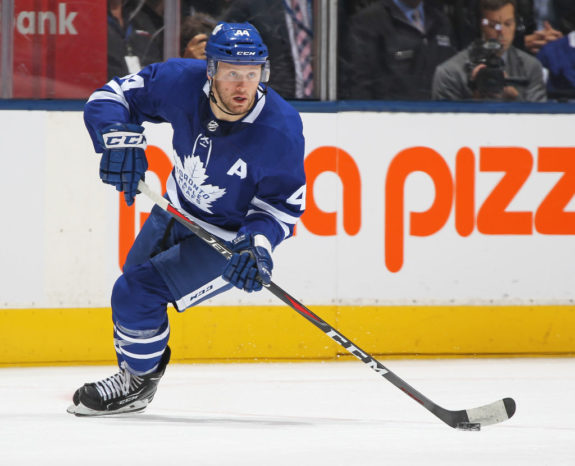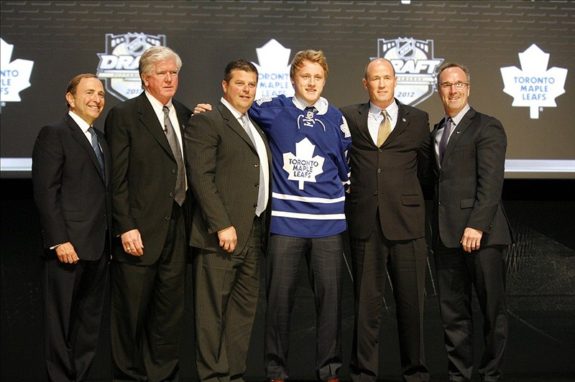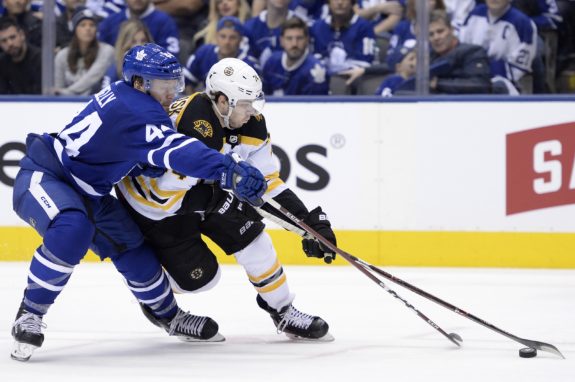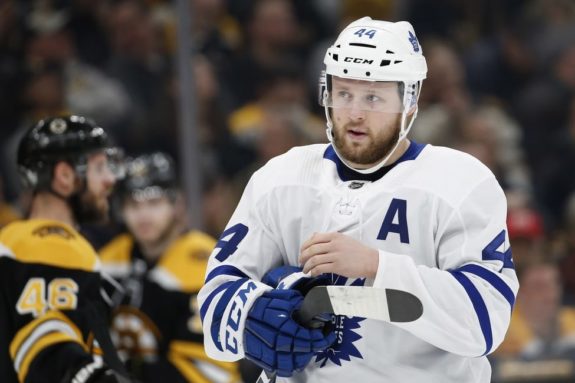Brent Burns, Erik Karlsson, Victor Hedman, Drew Doughty and John Carlson. As far as perennial Norris Trophy candidates go, these are the names that you will be forced to leapfrog if you want to take home the most prestigious defenseman award in the NHL. Of course, last year’s winner — Calgary Flames’ Mark Giordano — is blatantly showing no signs of slowing down. He will be 36 years old come the Flames’ season-opener on Oct. 3, which happens to be his birthday.
Add in younger names such has Seth Jones, Jacob Trouba, Zach Werenski, Thomas Chabot and Miro Heiskanen — all potential future Norris Trophy defenders — and you can see that the competition is both plentiful and fierce. In fact, 112 NHL blueliners skated in 70-plus games last season. That’s the field you’re up against if you want to be named the NHL’s top defenseman. With such stiff competition, can the Toronto Maple Leafs’ Morgan Rielly win the Norris Trophy in 2019-20?

The answer to that exact question is yes. We saw Norris-worthy play from the six-year veteran last season, and his name was certainly in the conversation despite not being one of the three rear guards nominated for the award. That said, there’s another question that needs to be answered here, similar to the original one: How can Rielly win the Norris Trophy in 2019-20?
Growth
We knew Rielly was loaded with potential after then-general manager Brian Burke drafted the Vancouver, BC, native with the fifth-overall pick in the 2012 NHL Entry Draft. What many may not remember is that it was a pick that carried risk as he tore his ACL in his draft year, skating in just 18 games with the Western Hockey League’s Moose Jaw Warriors that season, but managed 18 points. However, his final season of Major Junior hockey erased any doubts as he tallied 54 points in 60 games before joining the Maple Leafs’ American Hockey League affiliate the Toronto Marlies for their final 14 regular season games and 8 postseason contests, combining to tally 2 goals and 2 assists in those 22 games.
Rielly entered the NHL in the 2013-14 season on a Maple Leafs team without an identity and largely muddled in mediocrity. Despite the team’s downhill trajectory, his game did nothing but grow. He notched a healthy 27 points while skating just 17:38 as a 19-year-old rookie, and his point total — and ice time — advanced in each of the following two seasons. A decline in both took place in the 2016-17 season; however, his seemingly turned a corner in the 2017-18 season with a career-high 52 points despite skating just 21:36 a night.

Rielly then shattered previous career highs with 20 goals and 72 points while skating in all 82 games last season. His plus-24 rating was the only positive rating of his career and his 54.8% Corsi for% also marked a career high. However, while the growth in production is wonderful, it’s the growth in usage that has taken his game to a whole new level. Consider the following:

In the 2015-16 season, the first season under head coach Mike Babcock in which the Maple Leafs finished dead-last in league standings, Rielly started 52.6% of his shifts in the defense zone. Babcock limited Rielly’s power play time that season — and the one following — and focused his young, budding blueliner’s game on defense first, knowing the offensive potential was always there.
Fast forward to his last season when Rielly began just 39.5% of his shifts in the defensive zone. Thanks to his usage under Babcock, Rielly’s overall game is much stronger and the offensive production has been unleashed with increased usage in offensive-friendly scenarios. As a result, it wouldn’t come as a surprise to see his offensive game take another step forward in 2019-20 after finishing third in defensive scoring last season behind only Burns and Giordano, two of the three Norris Trophy nominees.

Team Performance
Consider last year’s three Norris finalists. Giordano’s Norris win came in a season in which the Flames paced the Western Conference with 107 regular season points (fortunately, the voting is for the regular season only as the Flames were unceremoniously discarded in the first round by the Avalanche ). Burns’ Sharks finished as the second seed in the west thanks to a 101-point campaign. Finally, Hedman’s Lightning were a record-setting regular season team and blew the rest of the league away with a 128-point regular season. Noticing anything here?
Rielly’s Maple Leafs finished with 100 points — good for third in a loaded Atlantic Division — however, they stumbled down the stretch and that 100 points ended in a three-way tie for seventh in league standings. Two fewer points and they were almost in the middle of the pack.
The Maple Leafs are likely bound for another 100-point campaign despite skating in the NHL’s toughest division. Whether the litany of offseason moves engineered by GM Kyle Dubas actually improves the team can be debated, but what cannot be debated is the talent level up and down this roster — all the way from John Tavares and Auston Matthews up front to Rielly and Tyson Barrie on defense, ending with Frederik Andersen in goal. Talent-wise, the Maple Leafs are as good as any team in this league, perhaps save for the Lightning.
If the Maple Leafs can fulfill their potential as a team, it would certainly benefit Rielly’s chances of a Norris Trophy in his hands come late-June in Vegas.
Health
The term “barring health” cannot be taken lightly in professional sports. Unfortunately, even the healthiest of athletes can be taken down by freak instances, most of which simply cannot be avoided.

The only thing a player can do is take it upon himself to stay as healthy as possible from a physical standpoint and Rielly has done that with the best of them in his six-year NHL tenure. Sure, he has skated in all 82 regular-season games just twice in his career, but he’s never skated in fewer than 76 in each of the last five seasons. His 73 games played in 2013-14 came with some healthy scratches along the way, as expected for a 19-year-old rookie. He has managed to put the aforementioned ACL injury from juniors behind him and has skated in the 12th-most games among NHL defensemen since the 2014-15 season.
Rielly was right there last season. He finished third in defenseman scoring despite finishing tied for 29th in defenseman average ice time per game. Skating as the lone defenseman on a star-studded Maple Leafs top power play unit will keep his special teams production among the best in the league for his position. Potentially skating with a puck-mover such as Barrie — as opposed to previous partner Ron Hainsey — could benefit his even-strength production. Add in a potential first- or second-place finish in the Eastern Conference combined with continued health and Rielly’s chances of winning the Norris Trophy have never been better.